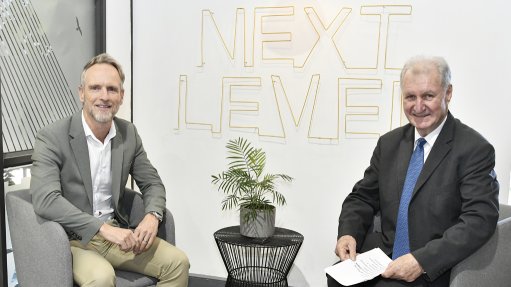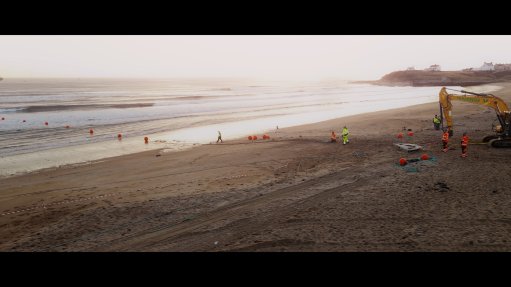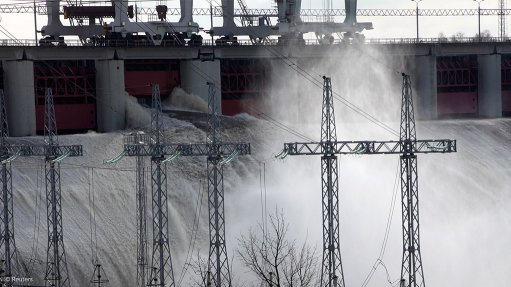Movable pump for iron-ore miner

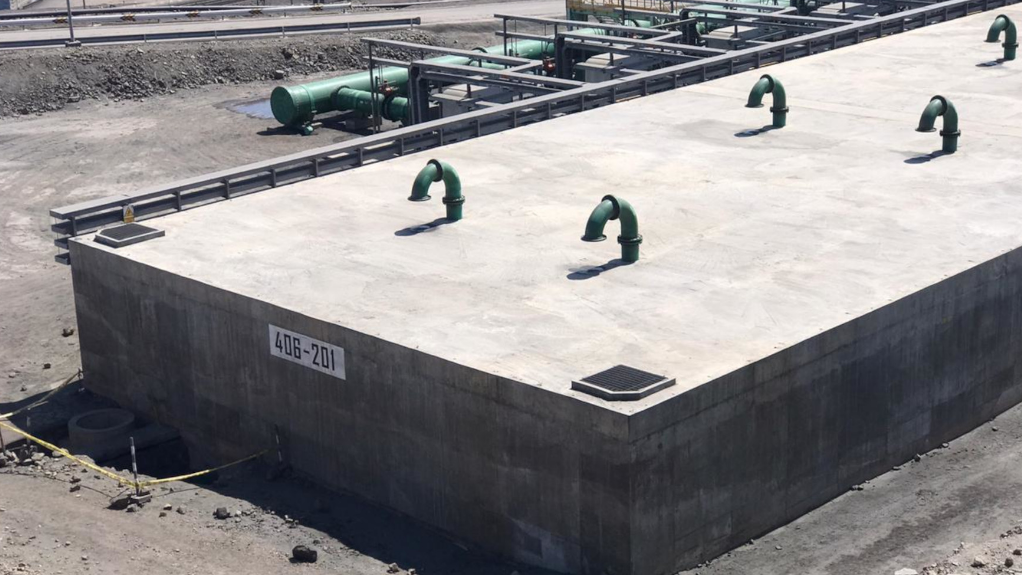
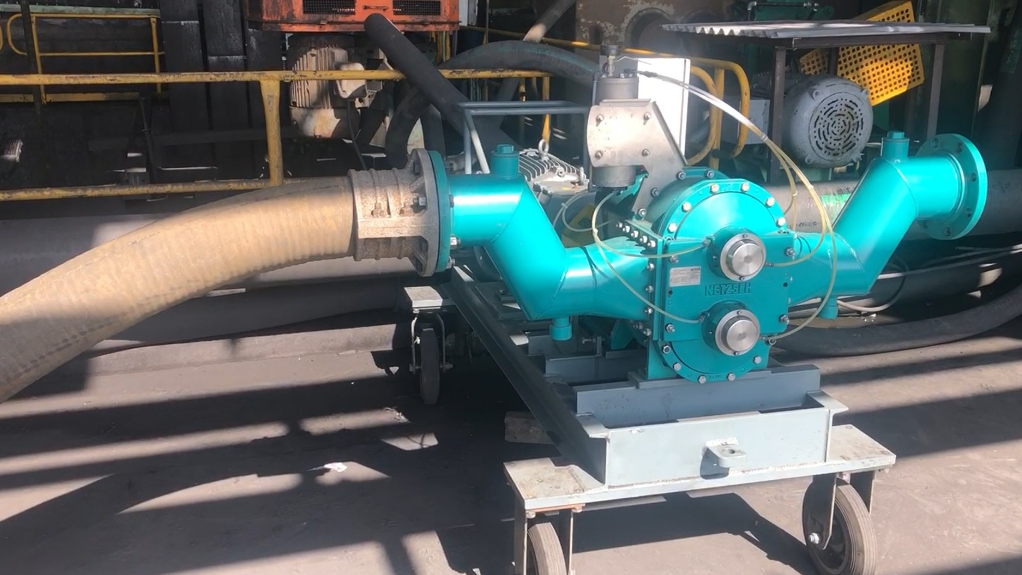
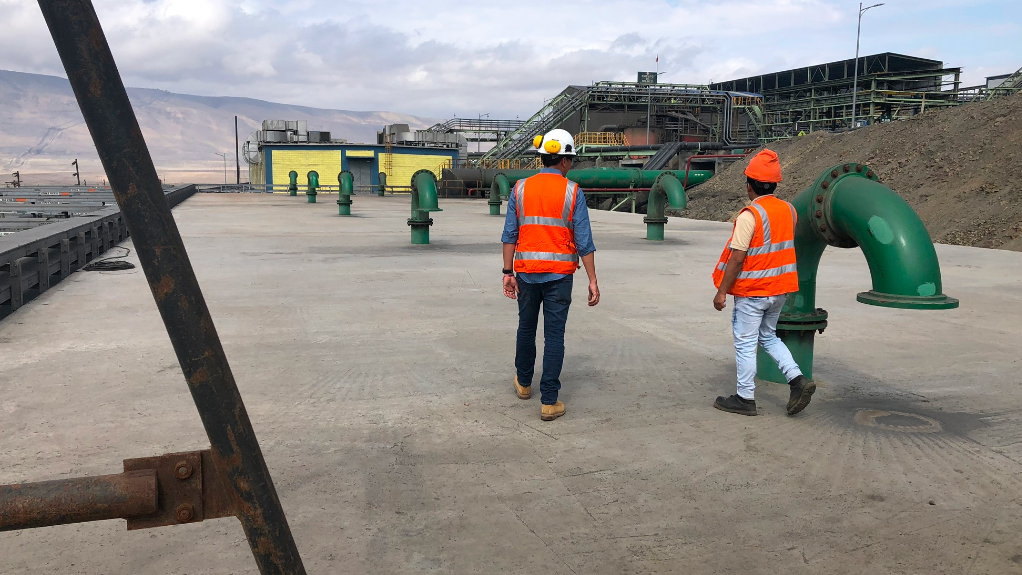
PROBLEM AREA Mine process water is sourced from a 10 521 m3 process tank which accumulated solids over time owing to magnesium and iron-rich slurry being pumped
MOBILITY To make handling easier for the mining company’s staff, the rotary lobe pump was installed on a mobile trolley and equipped with flexible hoses
MINING IN PERU Shougang Hierro Perú mines iron-ore and processes it into different products on the South coast of Peru
The Tornado T1 rotary lobe pump – designed by Germany-based pumps manufacturer NETZSCH for a variety of applications, including for the pumping of slurry – has had its use case for pumping process water in a reuse application demonstrated at an iron-ore mine in Peru.
Until November 2019, pumping process water to be reused in the processing of iron-ore at iron-ore miner Shougang Hierro Perú’s operation in the country was made difficult by the fact that the medium, which is collected in a tank on site, had a high solids content of 60% to 70%.
At the iron-ore deposits on the South coast of Peru, about 530 km from the capital Lima, Shougang Hierro Perú mines iron-ore and processes it into different products.
In addition to an openpit of about 150 km2, the complex comprises a processing area in the town of San Nicolás with a crushing plant that reduces the ore by 95%, as well as a magnetic separation plant, a filter plant and a pelleting plant.
This process separates the sterile ore from the iron-ore, which is then divided into two different product types: a high grade iron concentrate for sintering and another that is sent to the pelleting plant after a filtration process.
Water is required for many of the mine’s working steps, being sourced from a 10 521 m3 process tank, which is fed with the medium from concentrate and tailings thickeners.
In addition to the water, slurry with magnesium and iron deposits also accumulates in the tank. The liquid, rich in solids, is pumped over in the tank to then be used in different processes and locations, such as in the magnet plant.
NETZSCH global mining and explosives manager Monica Mitterstein explains that a flocculant is used to recover the slurry from the underflow. “The water coming from the overflow carries along solids that have accumulated in the tank over the course of many years.”
However, she notes that the water has to be as clean as possible to be reused in other processes.
“Owing to years of solids accumulation, there are many coarse particles in the water, which prevents its use in the downstream processes. This made pumping the fluid difficult,” says Mitterstein.
The mine owner initially decided to resolve the issue with a plant stop. The water was drained from the tank and the employees tried to remove the slurry layer, which was already up to 5 m thick, with shovels.
“This procedure turned out to be very unsatisfactory because the slurry had become extremely compressed and we had to introduce water again to peel it from the surfaces.
“When the deposits had not been removed after four days, those in charge decided to apply a different method,” she elaborates.
After manual attempts to drain the water and remove the sediment failed, the mine’s owner decided to purchase a submersible pump with an agitator.
Different Idea
However, this led to experts at NETZSCH recommending, instead, the deployment of a NETZSCH Tornado rotary lobe pump for pumping the slurry from the tank.
The Tornado T1 in size XLB- 3/2 was installed on a mobile trolley and placed near the tank in March 2021. The mine’s staff were able to move the hose freely inside the tank and the sediment could be removed without any issues.
The mobile trolley and flexible hoses made it easier to extract the slurry from the tank through the ten ventilation openings at the top of the tank, as well as through the corners.
The self-priming, positive displacement Tornado pump employs two synchronised rotors inside the pump that intermesh, generating negative pressure at the intake side that continuously pulls the medium towards the rotary lobes, which then transport it to the delivery side.
The strong suction capability enables the pump to work with a high flow rate and handle a high solids content, while a geared motor with low speed reduces the level of wear.
This pump application applies to low viscosity and high viscosity substances, as well as to thixotropic or dilatant substances, and lubricating, non-lubricating, shear-sensitive or abrasive media.
A double mechanical seal and a rotary lobe made of nitrile rubber reduces the risk of abrasion damage.
“It is, therefore, ideal for the process water at the mine in Peru and can pump out the medium at a high flow rate, despite the high solids content of up to 70%,” says Mitterstein.
Materials adapted to the medium additionally increase the durability of the rotary lobes as well as their service life.
Tri-lobe helical rotors made of nitrile are used for the application in Peru to reduce the risk of abrasion damage.
Article Enquiry
Email Article
Save Article
Feedback
To advertise email advertising@creamermedia.co.za or click here
Comments
Press Office
Announcements
What's On
Subscribe to improve your user experience...
Option 1 (equivalent of R125 a month):
Receive a weekly copy of Creamer Media's Engineering News & Mining Weekly magazine
(print copy for those in South Africa and e-magazine for those outside of South Africa)
Receive daily email newsletters
Access to full search results
Access archive of magazine back copies
Access to Projects in Progress
Access to ONE Research Report of your choice in PDF format
Option 2 (equivalent of R375 a month):
All benefits from Option 1
PLUS
Access to Creamer Media's Research Channel Africa for ALL Research Reports, in PDF format, on various industrial and mining sectors
including Electricity; Water; Energy Transition; Hydrogen; Roads, Rail and Ports; Coal; Gold; Platinum; Battery Metals; etc.
Already a subscriber?
Forgotten your password?
Receive weekly copy of Creamer Media's Engineering News & Mining Weekly magazine (print copy for those in South Africa and e-magazine for those outside of South Africa)
➕
Recieve daily email newsletters
➕
Access to full search results
➕
Access archive of magazine back copies
➕
Access to Projects in Progress
➕
Access to ONE Research Report of your choice in PDF format
RESEARCH CHANNEL AFRICA
R4500 (equivalent of R375 a month)
SUBSCRIBEAll benefits from Option 1
➕
Access to Creamer Media's Research Channel Africa for ALL Research Reports on various industrial and mining sectors, in PDF format, including on:
Electricity
➕
Water
➕
Energy Transition
➕
Hydrogen
➕
Roads, Rail and Ports
➕
Coal
➕
Gold
➕
Platinum
➕
Battery Metals
➕
etc.
Receive all benefits from Option 1 or Option 2 delivered to numerous people at your company
➕
Multiple User names and Passwords for simultaneous log-ins
➕
Intranet integration access to all in your organisation











